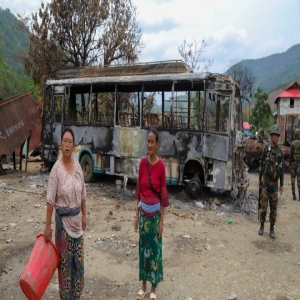

Prime Minister Narendra Modi's visit to Manipur is being planned, according to reports, amid his scheduled visits to Assam and Mizoram on September 13 this month. His visit carries enormous significance considering Prime Minister Modi's astounding silence for more than two years since the ethnic conflict erupted in Manipur in May 2023, except for rare occasions when he was compelled by the opposition in the Parliament to speak on the issue.
Prime Minister Modi and his BJP party, as well as its affiliates, have long been viewed as soft on the Meitei ethnic community, constituting the majority ethnic group of Manipur, in their role towards instigating the violence against the Kuki community, the second largest minority ethnic group. The party's engagement in majoritarian politics, which is to support the majority ethnic communities of all states and bring them to the Hindu fold (except those states where Muslims are a majority) in a bid to realise the vision of building a Hindu nation, has been held largely responsible for inciting the ethnic conflict. Once belonging to animistic religion and seeking independence from India, the Meitei community now identifies itself with Hindu nationalism by claiming itself to be constituting of original inhabitants of Manipur. On the other side, the Kukis have been condemned as illegal immigrants from Myanmar by them.
The Chief Minister of Manipur Nongthombam Biren Singh, hailing from the Meitei ethnic community, tacitly received the backing of the Central government to formulate and implement strategies that targeted at ethnic cleansing by displacing the Kuki tribal people from their villages not only in the guise of protecting forest but by taking concerted steps to ensure biometric attendance of Kukis to find out illegal immigrants from Myanmar. His administration also indirectly targeted the community by accusing the illegal immigrants from Myanmar of being involved in the illicit drug business. The people of the Meitei community have also been involved in plundering the arms and weapons of the police and army to prevail over, as well as to cleanse Kukis from their habitats.
Act East Policy Hinges on Peace in Manipur
Prime Minister Modi's silence was largely driven by this majoritarian ideological fuel that went into the ethnic conflict. However, the leader understands that this conflict has not only resulted in a humanitarian crisis, resulting in deaths and displacements of many people, but it has also undermined his much-touted Act East policy to a great extent. The protracted unrest in Myanmar has stalled projects, including a highway linking India to Myanmar and Thailand. It has also prevented the northeast's coastal access by building a road to the Burmese river town of Paletwa.
Ironically, Prime Minister Modi who has been addressing different issues in his radio programme Mann Ki Baat has been maintaining cautious silence on the Manipur ethnic conflict which has witnessed macabre incidents from people of a community setting fire to the people of the other to forcible stripping off clothes of women and cases of inhuman torture, sexual violence and rapes onto destruction of Churches and Temples.
Meanwhile, the displaced people are living in horrible humanitarian conditions, with a trifle of aid being dispatched to the camps. The President's rule has enhanced army and police control in the region without any meaningful assistance towards alleviating human suffering. Following the high court ruling, which sought to extend the privileges of the minority to the majority ethnic community and the systemic involvement of state machinery henceforth in tandem with the majority community in the project of ethnic cleansing since May 2023, constitutional safeguards for the minority ethnic communities to preserve their language, culture, and heritage have come under increased scrutiny.
Prime Minister Modi's visit, in this light, must not be theatrical just to manage the optics, but it must have a definitive roadmap for lasting peace between the communities by assuring the minorities of the protection of constitutional safeguards and clearly laying out his government's plan of action for handling the humanitarian concerns. India's richness lies in its ability to forge unity in diversity. Once the glue of secular and democratic ethos is torn apart, it will likely spill over to other regions and communities who would either subscribe to ethnic cleansing or demand more autonomy. The ideological baggage of majoritarianism must be set aside for the sake of national cohesion and unity. Assuming normalcy under the President's rule would be foolhardy and would not deliver real peace in Manipur.